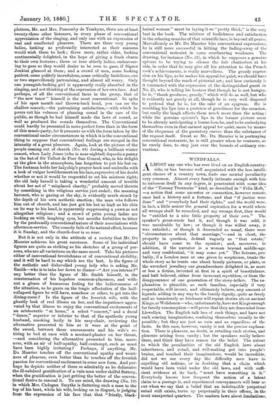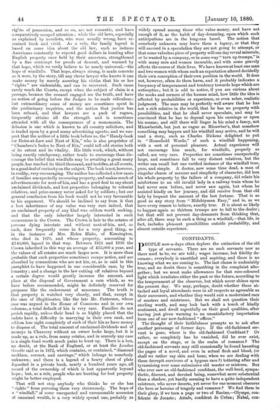WINDFALLS.
ALDIOST any one who has ever lived on an English country- side, or has become well acquainted with the less intelli- gent classes of a country town, finds one mental peculiarity very common. Almost every family intimate enough with him to unbosom itself in any degree, is penetrated with some idea of the "Tommy Trounsem " kind, as described in " Felix Holt," —a notion that some ancestor or connection, however remote, once had a history and a fortune, and that "if justice were done" and "everybody had their rights," and the world were, in fact, a little nearer the general aspiration for a world where all wrongs shall be remedied, and my wrongs first, they would be "entitled to a nice little property of their own." The speaker's great-uncle had it, and though it was sold, it was unsaleable by law ; or though it was willed away, it was entailed ; or though it descended as usual, there were "circumstances about that marriage,"—and in short, the property in question, defined vaguely as "that estate," should have come to the speaker; and, moreover, in addition, if the narrator is a woman beyond middle-age, and very confidential, "it may come yet." The listener, pro- bably, if a London man or one given to scepticism, treats the whole story as he treats one about family pictures, or plate, or the wretched jewellery our grandmothers delighted in, as more or less a fiction, invented at first in a spirit of boastfulness, and half believed, either from incessant repetition, or from the disappearance of one generation of the story-tellers. The ex- planation is plausible, as such families, especially if very respectable, will invent, and ultimately believe, any amount of legends adding in any way to the family dignity, quite as freely and as tenaciously as Irishmen will repeat stories about ancient Kings, or Welshmen—who, unfortunately, have not Kings enough for family consumption—will prove that they are descended from Llewellyn. The English talk less of such things, and have not such soaring imaginations, confining themselves usually to the possible ; but they are just as vain and as regardless of the facts. In this case, however, vanity is not the precise explana- tion. There is pleasure, no doubt, in retailing such stories, and pleasure arising from vanity; but the speakers really believe them, and think they have reason for the belief. The extent to which the peculiarities of the old English laws about inheritance, and entail, and will-making got into people's brains, and touched their imaginations, would be incredible, did not we see every day the difficulty men have in expelling old notions, or in doubting that a claim which would have been valid under the old laws, and with suffi- cient evidence at its back, "must have something in it." Everybody knows how frequent the notion of a latent claim to a peerage is, and experienced conveyancers will bear us out when we say that a belief that an indefeasible perpetual entail still exists, turns up perpetually in their offices, in the most unexpected quarters, The modern laws about. limitations,
rights of possession, and so on, are not romantic, and have comparatively escaped attention ; while the old laws, especially as explained by novelists, who were usually wrong, have re- mained fresh and vivid. As a rule, the family legend is based on some idea about the old law, such as induces Americans constantly to expend good dollars in hunting after English property once held by their ancestors, strengthened by a fine contempt for proofs of descent, and warmed by that hope, which we verily believe to be nearly universal,—the hope of windfalls. That hope, always strong, is made concrete as it were, by the story, till any clever lawyer who knows it can make money by merely assuring his victim that his or her " rights " are undeniable, and can be recovered. Such cases rarely reach the Courts, except when the subject of claim is a peerage, because the counsel engaged see the truth, and have no notion of going before the Judges to be made ridiculous ; but extraordinary sums of money are sometimes spent in the preliminary inquiries, and the notion that justice has been refused, and that lawyers are a pack of rogues, frequently attains all the strength and is sometimes attended with all the consequences of a monomania. The delusion is one which is known to all country solicitors, and is traded upon by a good many advertising agents; and we sus- pect that the author of a little book before us, the "Handy-book for Heirs-at-Law and Next of Kin," who is also proprietor of Chambers's Index to Next of Kin," could tell odd stories both of its extent and its vitality. His little work, which, without being exactly catchpenny, rather tends to encourage than dis- courage the belief that windfalls may be awaiting a great many people, has reached its third thousand, and, testifies, at all events, to a good deal of curiosity on the subject. The book is not, however, in reality, very encouraging. The author has collected a few cases of families unexpectedly recovering property, and makes much of advertisements for next-of-kin, and has a good deal to say about unclaimed dividends, and lost properties belonging to colonial relatives, and prize-money never asked for by soldiers ; but our general conclusion from his book would not be very favourable to his argument. We should be inclined to say from it that a lost inheritance of any value was very rare indeed, that an unclaimed property of any kind was seldom worth seeking, -and that the only inheritor largely interested in such occurrences is the Crown. The Crown is heir to the estates of persons dying intestate and without next-of-kin, and, as such, does frequently come in for a very good thing, as in the instance of Mrs. Helen Blake, of Kensington, who died in 1876, and whose property, amounting to 2140,000, lapsed in that way. Between 1824 and 1830 the Crown inherited in this way an average of £35,000 a year, and the values of all estates are much larger now. It is more than probable that such properties sometimes escape notice, and are absorbed by connections who are not kin, or, as is said in this pamphlet to have happened in one considerable case, by the tenantry ; and a change in the law cutting off relatives beyond a certain degree would greatly increase the amount, and place at the disposal of Government a sum which, as we have before recommended, might be definitely reserved for purposes like the endowment of museums. The truth is that property is watched very closely, and that, except in the case of illegitimates, like the late Mr. Patterson, whose case was argued in the House of Commons and in our own columns, a total default of kin is very rare. Families do not perish rapidly, unless their head is so highly placed that the cadets have a difficulty in marrying in their own rank, and seldom lose sight completely of such of their kin as have money to dispose of. The total amount of unclaimed dividends and of moneys in Chancery without an owner looks large, but it is made up, as a rule, from many estates, and in scarcely any case is a single fund worth much pains to hunt up. There is a box, no doubt, at the Bank of England, or at least the London Gazette said so in 1872, which contains, or contained, "diamond necklace, coronet, and earrings," which belongs to somebody unknown; and there is a legend of a heavy chest of plate deposited in a private bank, nearly a hundred years ago, all record of the ownership of which is lost apparently beyond hope ; but, as a rule, people who are hunting for lost property might be better employed.
That will not stop anybody who thinks he or she has rights" from pursuing them very strenuously. The hope of a "windfall," of some unexpected and unreasonable accession of unearned wealth, is a very widely spread one, probably as widely spread among those who value money, and have not enough of it, as the habit of day-dreaming, upon which such anticipations are in the long-ran based. The notion that somebody unknown may leave them a legacy, or that they will succeed in a speculation they are not going to attempt, or that some valueless piece of property will one day reveal minerals, or be wanted by a company, or in some way" turn up tramps," is with many men and women incurable, and with some gravely affects the course of their lives. We have known at least one man and two women with whom such an expectation altered decidedly their own conception of their own position in the world. It does not, however, often do them harm, and it probably indicates a buoyancy of temperament and tendency towards hope which are antiseptics ; but it is odd to notice, if you are curious about the nooks and corners of the human mind, how little the idea is affected by probabilities or experience, or even sober, realistic judgment. The man may be perfectly well aware that he has not a rich relative in the world, that he has no property with possibilities, and that he shall never speculate, and may be convinced that he has to depend upon his earnings or upon his means ; and still there will linger in his mind a fancy, not Micawberish, but just as vague as Micawber's, that somehow something may happen and his windfall may arrive, and he will read a story, such as Charles Dickens delighted to put in "Household Words," of such a windfall happening, with a sort of personal pleasure. Actual experience will not encourage him much, for windfalls, properly so called, are very rare. Properties are sometimes unexpectedly large, and sometimes fall to very distant relatives, but the writer can recall but one verified instance of the windfall true, pure, and simple. A doctor, now some time dead, a man of singular charm of manner and simplicity of character, did lose his whole property by the failure of a company, did relate his misfortune to an old invalid lady in a railway train whom he had never seen before, and never saw again, but whom he assisted kindly on her journey, and did receive from that old lady by bequest the amount of the lost fortune. That is as good as any story from "Midshipman Easy," and is, as we have every reason to believe, exactly true. It is about as likely to happen again as thirteen trumps are to fall to the dealer; but that will not prevent day-dreamers from thinking that, after all, there may be such a thing as a windfall,—that life, in fact, includes pleasant possibilities outside probability, and almost outside experience.



































 Previous page
Previous page